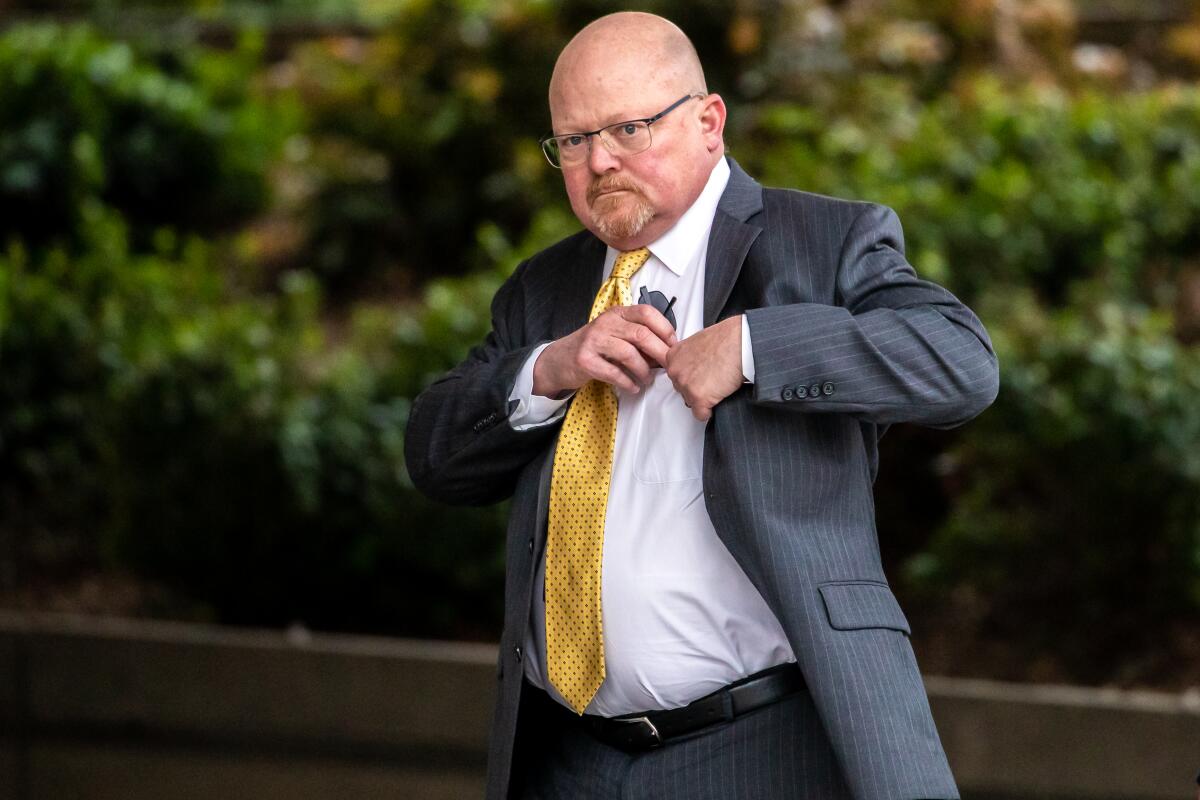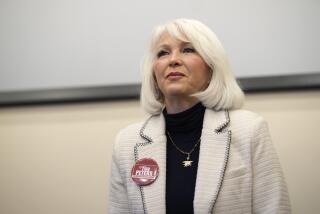Former top city attorney gets 9 months of home detention in DWP corruption case

- Share via
A former high-level lawyer in the Los Angeles city attorney’s office was sentenced Tuesday to nine months of home detention for taking part in an extortion scheme tied to the Department of Water and Power’s 2013 billing debacle.
Thomas Peters of Pacific Palisades also was ordered to pay a $50,000 fine for his role in the sprawling corruption case involving the DWP and the city attorney’s office.
The sentence was far more lenient than the 18 months in prison sought by federal prosecutors and the 41 months in prison recommended by the United States Probation Office.
Peters, 57, who oversaw the city’s civil litigation branch under former City Atty. Mike Feuer, admitted in a plea agreement last year that he aided and abetted an extortion scheme.
He threatened to fire one of the city’s outside lawyers unless that person paid off someone who was threatening to reveal damaging information about city lawyers’ handling of the DWP’s billing mess, according to his plea agreement.
U.S. District Judge Stanley Blumenfeld Jr., in sentencing Peters on Tuesday, called the case “an incredibly sordid affair.” But he also questioned the extent of the “harm” done by Peters.
Thomas Peters, a former official in the Los Angeles city attorney’s office, has agreed to plead guilty to one count of aiding and abetting extortion.
Peters, in speaking to the judge Tuesday, called his actions “shameful.” He declined to comment after the hearing. His wife, Los Angeles Superior Court Judge Elaine Mandel, was among those in the courtroom when the verdict was read.
Peters is the third former city employee to be sentenced in the corruption case that has cost the DWP more than $100 million, according to an initial estimate by the utility.
David Wright, the former top executive at the DWP, was sentenced in April 2022 to six years in federal prison for bribery. In June, David Alexander, the DWP’s former cybersecurity chief, was sentenced to four years in prison for lying to federal authorities.
Peters was a senior member of Feuer’s team when the DWP rolled out a new system that sent inaccurate bills to hundreds of thousands of customers. The city attorney’s office hired two outside attorneys, Paul Paradis and Paul Kiesel, to sue PricewaterhouseCoopers, the consulting firm that the city blamed for the billing debacle.
Around the time Paradis began working with the city, he had also been representing Antwon Jones, a DWP customer who was looking to sue over the faulty utility bills. Several DWP ratepayers already had filed lawsuits against the utility after being overcharged.
Ultimately, Paradis and an official in the city attorney’s office — whom prosecutors have not named — devised a plan to settle all the lawsuits against the city by finding a lawyer to represent Jones. That way, the class-action lawsuit involving Jones and other ratepayers would be settled quickly on terms agreeable to the city.
In 2017, Peters — then heading the civil litigation office for Feuer — learned that a former employee of Kiesel, the outside lawyer helping to sue PricewaterhouseCoopers, had threatened to go public with damaging information about the city’s handling of the billing litigation unless she received more than $1 million, the plea agreement states.
That former employee had “sensitive documents” showing that the city’s legal team had secretly colluded with the lawyer representing DWP ratepayers in the billing lawsuit, prosecutors said.
In his plea agreement, Peters confirmed that he feared that if the employee went public with those documents, she would show that the settlement negotiations between the DWP and its ratepayers were not the “adversarial proceeding” that they were supposed to be, which would in turn jeopardize the city’s $67-million settlement and damage the reputation of Feuer’s office.
Peters instructed Kiesel to satisfy the staffer’s financial demand — and warned him that he would be fired if he didn’t. In his plea agreement, Peters admitted that he knew the employee’s conduct constituted extortion.
Is there abandoned furniture on your block? Pothole driving you nuts on your commute? Use Shape Your L.A. to learn how to get your city government to address everyday issues.
At Tuesday’s hearing, Blumenfeld noted that Peters didn’t come up with the idea for the collusive lawsuit, although he did go along with it once he learned about it. Blumenfeld also said that despite its origin, the DWP settlement appeared to be “beneficial” to the public because ratepayers’ money was recouped.
Some critics, however, objected to the final settlement, arguing that it gave too much power to the DWP because it let the utility determine how much customers should be repaid.
Prosecutors said they sought a reduced prison sentence for Peters because he helped with their criminal investigation and a State Bar of California probe.
Assistant U.S. Atty. Susan Har told Blumenfeld on Tuesday that she was worried about the message it would send to the public if Peters didn’t serve any time in prison. She noted that the city fought demands by PricewaterhouseCoopers to produce documents that would have revealed the collusive lawsuit and that Peters was “tethered” to that case.
But Blumenfeld suggested that he didn’t think Peters serving time in prison would deter other attorneys from committing misdeeds.
More to Read
Sign up for Essential California
The most important California stories and recommendations in your inbox every morning.
You may occasionally receive promotional content from the Los Angeles Times.













